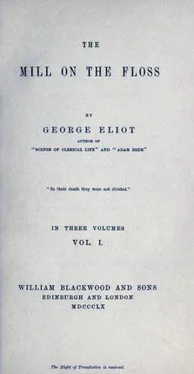Chapter VI. The Aunts and Uncles Are Coming
It was Easter week, and Mrs. Tulliver's cheesecakes were more exquisitely light than usual. "A puff o' wind 'ud make 'em blow about like feathers," Kezia the housemaid said, feeling proud to live under a mistress who could make such pastry; so that no season or circumstances could have been more propitious for a family party, even if it had not been advisable to consult sister Glegg and sister Pullet about Tom's going to school.
"I'd as lief not invite sister Deane this time," said Mrs. Tulliver, "for she's as jealous and having as can be, and's allays trying to make the worst o' my poor children to their aunts and uncles."
"Yes, yes," said Mr. Tulliver, "ask her to come. I never hardly get a bit o' talk with Deane now; we haven't had him this six months. What's it matter what she says? My children need be beholding to nobody."
"That's what you allays say, Mr. Tulliver; but I'm sure there's nobody o' your side, neither aunt nor uncle, to leave 'em so much as a five-pound note for a leggicy. And there's sister Glegg, and sister Pullet too, saving money unknown, for they put by all their own interest and butter-money too; their husbands buy 'em everything." Mrs. Tulliver was a mild woman, but even a sheep will face about a little when she has lambs.
"Tchuh!" said Mr. Tulliver. "It takes a big loaf when there's many to breakfast. What signifies your sisters' bits o' money when they've got half-a-dozen nevvies and nieces to divide it among? And your sister Deane won't get 'em to leave all to one, I reckon, and make the country cry shame on 'em when they are dead?"
"I don't know what she won't get 'em to do," said Mrs. Tulliver, "for my children are so awk'ard wi' their aunts and uncles. Maggie's ten times naughtier when they come than she is other days, and Tom doesn't like 'em, bless him! — though it's more nat'ral in a boy than a gell. And there's Lucy Deane's such a good child, — you may set her on a stool, and there she'll sit for an hour together, and never offer to get off. I can't help loving the child as if she was my own; and I'm sure she's more like my child than sister Deane's, for she'd allays a very poor color for one of our family, sister Deane had."
"Well, well, if you're fond o' the child, ask her father and mother to bring her with 'em. And won't you ask their aunt and uncle Moss too, and some o' their children?"
"Oh, dear, Mr. Tulliver, why, there'd be eight people besides the children, and I must put two more leaves i' the table, besides reaching down more o' the dinner-service; and you know as well as I do as my sisters and your sister don't suit well together."
"Well, well, do as you like, Bessy," said Mr. Tulliver, taking up his hat and walking out to the mill. Few wives were more submissive than Mrs. Tulliver on all points unconnected with her family relations; but she had been a Miss Dodson, and the Dodsons were a very respectable family indeed, — as much looked up to as any in their own parish, or the next to it. The Miss Dodsons had always been thought to hold up their heads very high, and no one was surprised the two eldest had married so well, — not at an early age, for that was not the practice of the Dodson family. There were particular ways of doing everything in that family: particular ways of bleaching the linen, of making the cowslip wine, curing the hams, and keeping the bottled gooseberries; so that no daughter of that house could be indifferent to the privilege of having been born a Dodson, rather than a Gibson or a Watson. Funerals were always conducted with peculiar propriety in the Dodson family: the hat-bands were never of a blue shade, the gloves never split at the thumb, everybody was a mourner who ought to be, and there were always scarfs for the bearers. When one of the family was in trouble or sickness, all the rest went to visit the unfortunate member, usually at the same time, and did not shrink from uttering the most disagreeable truths that correct family feeling dictated; if the illness or trouble was the sufferer's own fault, it was not in the practice of the Dodson family to shrink from saying so. In short, there was in this family a peculiar tradition as to what was the right thing in household management and social demeanor, and the only bitter circumstance attending this superiority was a painful inability to approve the condiments or the conduct of families ungoverned by the Dodson tradition. A female Dodson, when in "strange houses," always ate dry bread with her tea, and declined any sort of preserves, having no confidence in the butter, and thinking that the preserves had probably begun to ferment from want of due sugar and boiling. There were some Dodsons less like the family than others, that was admitted; but in so far as they were "kin," they were of necessity better than those who were "no kin." And it is remarkable that while no individual Dodson was satisfied with any other individual Dodson, each was satisfied, not only with him or her self, but with the Dodsons collectively. The feeblest member of a family — the one who has the least character — is often the merest epitome of the family habits and traditions; and Mrs. Tulliver was a thorough Dodson, though a mild one, as small-beer, so long as it is anything, is only describable as very weak ale: and though she had groaned a little in her youth under the yoke of her elder sisters, and still shed occasional tears at their sisterly reproaches, it was not in Mrs. Tulliver to be an innovator on the family ideas. She was thankful to have been a Dodson, and to have one child who took after her own family, at least in his features and complexion, in liking salt and in eating beans, which a Tulliver never did.
In other respects the true Dodson was partly latent in Tom, and he was as far from appreciating his "kin" on the mother's side as Maggie herself, generally absconding for the day with a large supply of the most portable food, when he received timely warning that his aunts and uncles were coming, — a moral symptom from which his aunt Glegg deduced the gloomiest views of his future. It was rather hard on Maggie that Tom always absconded without letting her into the secret, but the weaker sex are acknowledged to be serious impedimenta in cases of flight.
On Wednesday, the day before the aunts and uncles were coming, there were such various and suggestive scents, as of plumcakes in the oven and jellies in the hot state, mingled with the aroma of gravy, that it was impossible to feel altogether gloomy: there was hope in the air. Tom and Maggie made several inroads into the kitchen, and, like other marauders, were induced to keep aloof for a time only by being allowed to carry away a sufficient load of booty.
"Tom," said Maggie, as they sat on the boughs of the elder-tree, eating their jam-puffs, "shall you run away to-morrow?"
"No," said Tom, slowly, when he had finished his puff, and was eying the third, which was to be divided between them, — "no, I sha'n't."
"Why, Tom? Because Lucy's coming?"
"No," said Tom, opening his pocket-knife and holding it over the puff, with his head on one side in a dubitative manner. (It was a difficult problem to divide that very irregular polygon into two equal parts.) "What do I care about Lucy? She's only a girl, — she can't play at bandy."
"Is it the tipsy-cake, then?" said Maggie, exerting her hypothetic powers, while she leaned forward toward Tom with her eyes fixed on the hovering knife.
"No, you silly, that'll be good the day after. It's the pudden. I know what the pudden's to be, — apricot roll-up — O my buttons!"
With this interjection, the knife descended on the puff, and it was in two, but the result was not satisfactory to Tom, for he still eyed the halves doubtfully. At last he said,–
"Shut your eyes, Maggie."
Читать дальше












